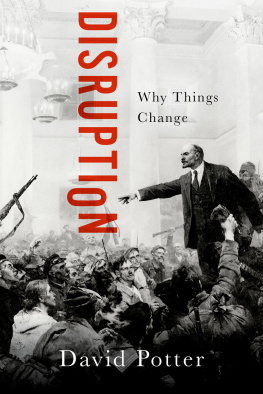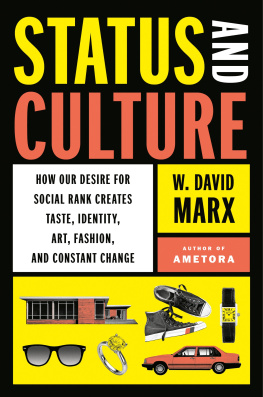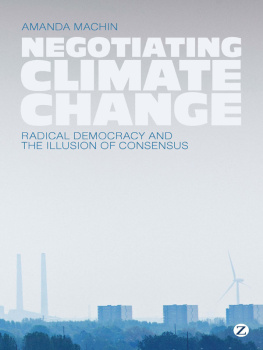DISRUPTION

Oxford University Press is a department of the University of Oxford. It furthers the Universitys objective of excellence in research, scholarship, and education by publishing worldwide. Oxford is a registered trade mark of Oxford University Press in the UK and certain other countries.
Published in the United States of America by Oxford University Press
198 Madison Avenue, New York, NY 10016, United States of America.
Oxford University Press 2021
All rights reserved. No part of this publication may be reproduced, stored in a retrieval system, or transmitted, in any form or by any means, without the prior permission in writing of Oxford University Press, or as expressly permitted by law, by license, or under terms agreed with the appropriate reproduction rights organization. Inquiries concerning reproduction outside the scope of the above should be sent to the Rights Department, Oxford University Press, at the address above.
You must not circulate this work in any other form and you must impose this same condition on any acquirer.
Library of Congress Cataloging-in-Publication Data
Names: Potter, D. S. (David Stone), 1957author.
Title: Disruption : why things change / David Potter.
Description: New York, NY : Oxford University Press, 2021. |
Includes bibliographical references and index.
Identifiers: LCCN 2020036736 (print) | LCCN 2020036737 (ebook) |
ISBN 9780197518823 (hardback) | ISBN 9780197518847 (epub)
Subjects: LCSH: Social change. | Creative destruction. | Human behavior.
Classification: LCC HM831.P686 2021 (print) |
LCC HM831 (ebook) | DDC 303.4dc23
LC record available at https://lccn.loc.gov/2020036736
LC ebook record available at https://lccn.loc.gov/2020036737
DOI: 10.1093/oso/9780197518823.001.0001
A.A. et W.G.F. in memoriam
CP-S et N.P. amore
Contents
This book was inspired by my tenure of the Ronald J. Mellor chair in Roman History at UCLA. I would especially like to thank Steve Aaron, who stressed the importance of history as an outward-looking discipline, for creating the environment in which I could conceive of a project which is very different from any other that I have attempted in the past. My colleagues Joan Waugh, Stefania Tutino, Bill Marotti, Teofilo Ruiz, and Nile Green provided further inspiration for the project, as did my immediate, classically inclined colleague, David Phillips. The book was finished in my usual home, the Department of Classical Studies at the University of Michigan, where Sara Ahbel-Rappe and Lisa Nevett listened kindly as I rambled on about what I was doing. It is a particular pleasure to thank Tim Hart, who read through much of the manuscript at an early stage, contributing many helpful comments, as did George Woudhuysen at the University of Nottingham (neither of whom can be blamed for eccentricities that remain); Arianna Zapelloni Pavia read through the whole text at a late stage, saving me from a number of errors. Brittany Pendergraft provided invaluable assistance with the proofs.
Stefan Vranka at Oxford University Press nurtured this project from its earliest stages as the object of dinnertime conversation in Los Angeles through its conclusion, providing excellent editorial advice and seeking immensely helpful input from readers whose attention to detail has made this a much better book.
My wife Ellen has, as always, put up with the burden of the project, stacks of books piling up around the house, and rather a lot of discussion of the unsavory characters who fill the pages that follow. This would not be the book it is without her.
Finally, it seems appropriate in dedicating this book to look ahead and back. As I write, two old friends look over my shoulder from photos taken long ago, men who guided my early steps as an historian and who always stressed the civic importance of historical understanding, George Forrest and Tony Andrewes. Looking to the future and to what will, I hope, be a better, stronger world, the book is also dedicated to two people who bring joy to my life and Ellens every day: Natalie and Claire.
How do things change? Answering this question is a fundamental mission of historical study. It is also a profoundly important question to consider today, as the liberal democracies that set the tone for social and economic development over the past seventy years are facing extraordinary challenges. The convergence of increasing economic disparity and political fragmentation, the presence of alternative economic models offered by superficially successful totalitarian states, and a devastating disease are once again creating conditions in which a disruption like those that are the subject of this book can occur.
Disruptive change always begins on the fringes of society. Throughout time, the mainstream has been inherently conservative. Stable societies allow for incremental change but are essentially dedicated to the preservation of existing power structures. In such cases, dominant ideologies justify existing relationships. In the historical studies that follow, we will see how ideologies that develop in reaction to the ones supporting the status quo are necessary to guide profound changes in political and intellectual structures. A study of radical change is also a study of societies in which central institutions have failed and fundamental affiliations are severed.
Not all radical groups are the same, but all the groups that we will be examining take advantage of mistakes that challenged belief in the competence of existing institutions. The coincidence of an alternative ideological system with a period of community distress is the necessary condition for radical change. The agents of change are not the downtrodden and distressed, the disadvantaged or disenfranchised. They are inevitably members of a dominant political class who, when successful, take advantage of existing thought systems to create a new ideology of legitimacy. That said, they would not have succeeded in what they were trying to do if they were incapable of bringing large numbers of people along with them, if they were incapable of speaking a language that people outside their circles could understand, and were not speaking to basic concerns in the broader population.
An important point that will emerge from our studies is that disruptive actions do not always follow paths their original proponents might have predicted. Our studies, therefore, examine structures that can either facilitate or derail change.
A word that Im deliberately avoiding in discussing disruptions is revolution. One reason for this is that revolutions are very hard to define. In scientific terms, a revolution is simply a completed cycle. In political terms, revolution can be used as a synonym for civil war, regime change, or reform movement. Just as easily, it can mean the substitution of a new system of government or a complete change of ideas or methods. Although some of the events Ill be discussing are routinely called revolutions, well see that disruption is a better term. The French revolution, for example, substituted an imperial autocrat (Napoleon) for a king, and, when Napoleon was defeated, saw the restoration of the royal family that had been ousted prior to Napoleons rise to power. What was thoroughly disrupted in the course of all of this was not autocracy as a form of government, but the system that had sustained the autocracy. In Frances case this was the alliance between the nobility and the Catholic Church, upon which the monarchy had depended since the Middle Ages. The result of the Bolshevik revolution, which , for all its rhetoric of social revolution, was the replacement of an incompetent monarch whose authority rested upon increasingly fragile insitutions with a totalitarian dictator. What was disrupted was a traditional way of defining power. That is why the Bolshevik seizure of power differs significantly from the rise of the Communist Party in China, although that too is often referred to as a revolution. But the rise of the Communist Party in China did not involve the overthrow of the ancient imperial political order, which had collapsed decades earlier. Rather, it was the result of the communist victory over the Nationalist Party (Kuomintang) in what was effectively a contest between two ghouls for control of a corpse. As the example of the French or, as well also see, Nazi disruptions show, successful parties might not create stable new institutionsbut the result of the disruption was that it was impossible to go back to the way things had been.












